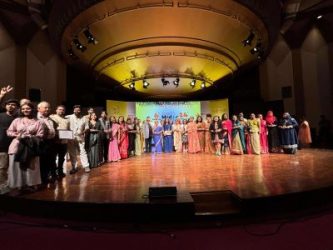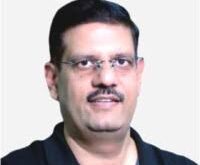- Stellar Contributions recognized in Media, Literature and Cinema in a A Night of Tears, Laughter, and Applause
 11th October 2024, Mumbai: “Media can shape the way we think, what we believe, and how we, as individuals and societies, value women and girls. By amplifying diverse voices and stories, and challenging stereotypes, the media has the power to transform social norms and promote gender equality and inclusion.” said UN Under-Secretary General and UNFPA Executive Director of UNFPA in her keynote address at the Laadli Media & Advertising Awards for Gender Sensitivity 2024. She was speaking as the chairperson of the ceremony which recognised 42 stellar contributions in the media, literature, cinema and advertising space across India and 14 journalists from seven South Asian nations on Wednesday evening at the Tata Theatre, NCPA, Mumbai.
11th October 2024, Mumbai: “Media can shape the way we think, what we believe, and how we, as individuals and societies, value women and girls. By amplifying diverse voices and stories, and challenging stereotypes, the media has the power to transform social norms and promote gender equality and inclusion.” said UN Under-Secretary General and UNFPA Executive Director of UNFPA in her keynote address at the Laadli Media & Advertising Awards for Gender Sensitivity 2024. She was speaking as the chairperson of the ceremony which recognised 42 stellar contributions in the media, literature, cinema and advertising space across India and 14 journalists from seven South Asian nations on Wednesday evening at the Tata Theatre, NCPA, Mumbai.
Echoing her, eminent film, TV, web and theatre actor Ratna Pathak who was the Chief Guest of the occasion said “It was a revelation. It was wonderful to see the kind of work being done all over our country. So many young people are being awarded for their in-depth work in gender sensitivity. I am extremely happy that they are being felicitated here at Laadli Media Awards and their work is being celebrated.”
The Laadli Media and Advertising Awards for Gender Sensitivity celebrate the media’s role in shaping perceptions towards gender, aiming for a fairer society. Apart from India, the fourth edition of the South Asia Awards covered Pakistan, Afghanistan, Sri Lanka, Nepal, Bhutan, Bangladesh and Maldives.
These awards -which coincide with 50th year of UNFPA in India – are an initiative of Population First, a Mumbai-based social impact organisation that has been working for over two decades to promote gender sensitivity in media nationwide. Following a successful collaboration over the past several years, the initiative is once again being supported by UNFPA. Our collaborating partners for this edition are South Asian Women in Media (SAWM). We are also joined by NCPA, Madison Outdoor Media, Manifest and Social Samosa as our cause partners.
Andrea Wojnar, UNFPA India’s Representative, reflected on the significance of the Laadli Awards, stating, “Laadli, a form of endearment, is now a name that has grown to be recognised as a touchstone for gender sensitivity in media. Laadli has made media and communication professionals retell their stories from a gender perspective and enabled them challenge discriminatory norms and stereotypes in their work. Every year that I come, Laadli Media Awards is more creative and more impactful”
The Ex-CEO and Trustee of Population First, Dr. A.L. Sharada called the awards “a way of acknowledging the significant contribution of content creators across literature, advertising, films, and OTT platforms,” while the current Director Yogesh Pawar said “In my 30 years of journalism I’ve seen a lot of amazing work but what these awards aim to recognise and celebrate stands out. I feel proud to belong to a fraternity which includes the 10 exceptional awardees nationwide and the 14 South Asian journalists.”
The esteemed Laadli of the Century Award was presented to Dr Armaity Desai and the Laadli Lifetime Achievement Award was presented to Bachi Karkaria. Hetall Dedhhia received the Laadli Woman Behind the Screen Award, while Advocate Vrinda Grover was honoured with the Laadli Gender Champion Award.
While thanking Population First and UNFPA for the honour, nonagenarian Dr Armaity Desai who was bestowed the Laadli of the Century award underlined in her acceptance message how her idea of equality came from her gender-equal upbringing. She expressed gratitude for the opportunities she had as head of the College of Social Work at Nirmala Niketan, Tata Institute of Social Sciences and the University Grants Commission and thanked the relevant authorities for the freedom they gave her in implementing her ideas.
Columnist, chronicler of Urbania, author and media trainer and the first Indian on the World Editors’ Forum, Ms Bachi Karkaria – who was conferred the Laadli Lifetime Achievement Award -has always used journalism to put gender sharply on the agenda right from her earlier innings at The Statesman. Her interesectionalising of gender in urbanisation and public health reporting and her emergence as an advisor to several global bodies are the stuff legends are made of. Ms Karkaria whose satirical column Erratica with ToI and her pathbreaking bestseller books enjoy a cult following said she was thankful for the honour. “This is a gender sensitivity award from Population First and UNFPA, which makes it that much more special.”
One of the country’s fiestiest human rights lawyers – Vrinda Grover said it felt wonderful to receive the Laadli Gender Champion award. “I see it as a recognition, not just of my endeavours as a feminist lawyer, but as a part of the feminist movement, as we reach new horizons of freedom and justice for all.”
The event also conferred special Laadli awards to mark UNFPA completing 50 years in India. These awardees included Dr Harjant Gill for consistent engagement on Redefining Masculinity, Nidhi Jamwal for consistent engagement on Feminising Climate Solutions, Sheilu Sreenivasan for consistent engagement on Aging with dignity, Paromita Vohra for consistent engagement on needs and concerns of Adolescents and Young People, Anita Gurumurthy for consistent engagement on Gender & Technology, and Bishakha Datta for consistent engagement on Right to Bodily Autonomy.
This year’s Film Awards for Gender Sensitivity celebrated Kaathal – The Core, Laapataa Ladies, and All We Imagine as Light. The web series Taali was also recognised for its gender-sensitive narrative.
The event also featured a special performance of Sufi Kalaam | Songs of Women by Radhika Sood Nayak, Neil Mukherjee, and Vinayak Netke, adding a captivating musical dimension.
About Population First:
Population First is a social impact organisation dedicated to gender equality, women’s empowerment and community mobilisation.
Registered in March 2002, by Indian advertising doyen Bobby Sista, under the Bombay Public Trusts Act (1950) to leverage communication and media influence to address the social and demographic issues in the country, Population First believes that numbers are not the issue but the unequal social development and gendered mindsets are responsible for the poor social demographic indices – be it maternal and child mortality, child marriages or the falling sex ratios.
Population First focuses on the gendered mindsets which undermine the value of girls and women, promote discrimination against them and justify gender-based violence. The challenge is to change those mindsets.
 Newspatrolling.com News cum Content Syndication Portal Online
Newspatrolling.com News cum Content Syndication Portal Online







